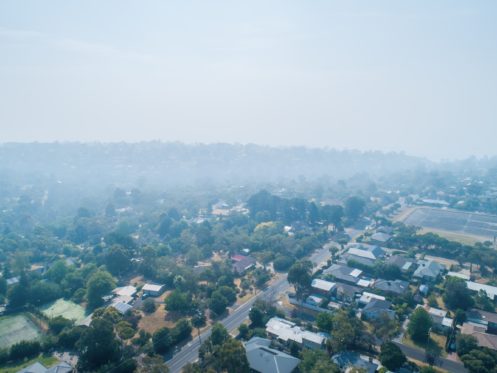As California’s air quality continues to deteriorate amidst the state’s record-breaking wildfires, residents might be wondering what is causing this even worse air quality than usual.
The current wildfires in the state’s southern regions are burning with an intensity that has never before been seen in California history. These fierce fires are also emitting smoke at unprecedented levels. This smoke contains particles that can worsen respiratory symptoms and irritate the eyes, nose, throat, and lungs. Below are ways in which California wildfires affect air quality.
1. Increased Pollution
The particulate matter in wildfire smoke primarily consists of very small particles. These particles are not only the size that can pass into the lungs, but they can also penetrate deep into the respiratory system. This smoke contains many pollutants that worsen the health effects of wildfire smoke exposure, such as carboxylic acids, ozone, and carbon monoxide gas. Wildfire smoke can even contain toxic substances, such as arsenic, selenium, cadmium, and chromium. The most prevalent pollutant in wildfire smoke, however, is organic matter. These organic particles are often made up of wood and vegetation materials that have been burned. The particulate matter in wildfire smoke is known to increase the amount of particulate matter in the air, which can worsen respiratory symptoms and worsen or worsen asthma symptoms.
2. Increased Risk of Asthma Attacks
Wildfire smoke can worsen asthma symptoms by impacting airways. Airway inflammation can lead to an asthma attack. The potential for this type of lung disorder is increased when smoke particles penetrate deep into the lung or into the air sacs in the lungs. Particles that are small enough to pass into this small opening cause inflammation, leading to shortness of breath and cough often associated with asthma attacks.
3. Respiratory Symptoms
Respiratory symptoms are another serious health concern associated with wildfire smoke. These symptoms are caused by inhaling wildfire smoke particles, which can cause sinus irritation, coughs, scratchy throat, and itchy eyes. TheseThese symptoms can occur even in healthy individuals, but they are most severe for individuals with other respiratory issues. Respiratory symptoms often worsen asthma systems or other underlying health complications that an individual may have or worsen pre-existing conditions.
4. Eye Irritation
The eye is also susceptible to the harmful effects of wildfire smoke. Individuals who are exposed to wildfire smoke particles can experience burning, watering, or gritty eyes. This happens when particles released from wood and vegetation materials are deposited deep in the eye’s tears. When these deposits of particles get into the presence of moisture, they can continue to irritate the eyes. The eye irritation associated with wildfire smoke is often accompanied by mild to moderate pain.
5. Choking
Research shows that particles found in wildfire smoke can irritate the throat, which increases the chances of smoking or coughing. Doctors often recommend that individuals with pre-existing conditions like asthma or acid reflux consider using an inhaler when this occurs. These hospital visits for asthma attacks occur in most cases when particles are inhaled deep enough to pass into the lungs.
6. Reduced Visibility
Wildfire smoke can reduce visibility, which makes driving more dangerous, and this also impacts air transportation. The pollution in wildfire smoke can cause changes in invisibility that are difficult for airports to manage because they cannot effectively measure the pollution levels in the air. Many factors contribute to reduced visibility, but particulate matter is one of the biggest issues. Even with air quality standards designed to protect individuals, the pollutants in wildfire smoke can lead to serious problems for pilots and drivers.
7. Degraded Air Quality Standards
Wildfire smoke is known to impact air quality standards. Many studies have shown that wildfire smoke affects air quality standards because of the pollutants released from burning wood and vegetation materials. These pollutants can often impact air quality standards, which are designed to protect an individual’s health. These standards are based on the types of pollutants that are released from wildfires. When wildfire smoke increases particulate matter in the air, these standards no longer accurately represent the health threat level present in the area.
8. Cancer
Information from the Centers for Disease Control and Prevention (CDC) shows that exposure to wildfire smoke for an extended period can cause cancer. According to the federal agency, exposure to wildfire smoke can lead to breathing problems, asthma attacks, cardiovascular problems, and even death. The CDC cites that the human health effects of exposure to wildfire smoke depend on specific exposure factors, including age, health conditions, physical activity levels, and other individual characteristics.
9. Respiratory Problems
Exposure to wildfire smoke can lead to respiratory problems, particularly for children and adults with pre-existing respiratory issues. The CDC has cited that exposure to wildfire smoke can worsen or cause respiratory irritation in individuals with asthma or other breathing problems. Those who suffer from these conditions should take extra precautions. This includes avoiding the outdoors where smoke levels are higher, keeping windows closed, and using air conditioning since air conditioning can help filter out particles found in wildfire smoke. Individuals with respiratory issues should also try to stay indoors as much as possible when wildfires are in their area.
10. Potentially Potent Health Effects
Wildfire smoke can have several potentially potent health effects. Smoked wood is known to contain contaminants that can affect people’s health. Particles in wildfire smoke can cause respiratory irritation, eye irritation, skin rashes, and even cancer. The CDC has also cited that exposure to wildfire smoke can cause cardiovascular problems, such as heart attacks and strokes, the leading causes of death among adults over 60 in the United States. In addition, exposure to wildfire smoke can worsen pre-existing conditions like asthma and other respiratory issues.
11. Poor Air Quality
The pollutants released from wildfires can lead to poor air quality. These pollutants can be a health risk for many different reasons, but individuals with pre-existing breathing problems are at the highest risk. Exposure to wildfire smoke has been tied to respiratory problems, eye irritation, and even cancer. Wildfire smoke can also degrade air quality standards, which means that air pollution levels may seem relatively safe in some areas, but they still pose a serious health threat. For air purification and filtration in Temecula, CA, and surrounding areas, contact We Care Plumbing, Heating, and Air for help. Our team of HVAC technicians can help you to breathe easier.
12. Increased Risk of Emphysema
According to the CDC, toxic air pollutants, such as benzene and formaldehyde, are more common in wildfire smoke than in other sources of pollution. It has also been shown that exposure to these substances is linked to increased risks for coughs, asthma attacks, and even cancer. Fires release several harmful chemicals into the air, some of which have long-term health effects known to cause cancer. The CDC has cited that smoke from wildfires can increase the likelihood of emphysema and smoke-related respiratory issues.
Wildfire smoke is one of the most serious risks for many people because it can cause health effects that develop into serious health problems. These issues can affect an individual’s daily life, which prevents them from performing daily tasks. Fortunately, it is easy to reduce the impact of wildfire smoke exposure. All individuals should avoid exposure to wildfire smoke whenever possible by staying indoors during the day and limiting outdoor activities at night. If you’re interested in AC repair and installation, heating maintenance and repair, water heater inspection, and plumbing services in Temecula, CA, and the surrounding areas, contact We Care Plumbing, Heating, and Air today.







